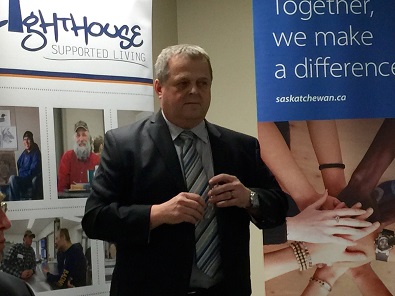In communities across Saskatchewan — from the biggest cities to the smallest hamlets — people are struggling to stay housed, or living without safe and reliable housing at all.
But service providers in rural communities say their clients face high barriers to getting help, without enough local resources to meet the need.
In Yorkton, Bruno’s Place shelter opened near the end of 2022, to great enthusiasm from the community.
“We got so much support from the community and the mayor and the city, and there was such a sense of relief when we opened,” said shelter co-ordinator Angela Chernoff.
“The donations have been really overwhelming for us, as well. I don’t think we’ve ever lacked for anything. … It’s been a huge blessing and a motivator to keep going.”
But almost as soon as Bruno’s Place opened, Chernoff said the shelter was fielding calls from all over the province — asking for help the fledgling shelter wasn’t equipped to offer.
“We’ve had people come to Yorkton, because they know that there is a shelter here now,” she said. “But the struggle with helping people get to that next step is that this is rural Saskatchewan. We have gaps in services.”
Chernoff said many shelter clients want to get into detox, but have no way of travelling to the nearest facility. Others just got out of detox and want to get into treatment for their addiction, but are stuck on a waiting list.
“And in that in-between, they’ll relapse,” she said. “We have all this waiting, and gaps, and lack of continuity and services.
“And it feels like we’re trying and trying and trying, but then it all unravels.”
Chernoff wants to help her shelter clients get the health care and support they need right in Yorkton, rather than sending them away to other areas of the province. But without enough local services, that’s nearly impossible.
“I would like to … not be sending everyone to Saskatoon and Regina — because what I’m hearing from Saskatoon and Regina is that you guys are overflowing, too,” said Chernoff. “There are just too many people and you can’t help everyone.
“So it would be amazing, as rural communities, if we could start shouldering more of that responsibility. But with all the gaps, it’s challenging.”
Located more than 300 kilometers north of Bruno’s Place, Nipawin Oasis Community Centre is also trying to help people stay housed, healthy and stable in their own home community.
Oasis’ executive director Joy Hanson said many of the community centre’s clients are people who have come to Nipawin from the surrounding communities in the hope of accessing shelter, schooling and employment — and the need for support is going up.
“Before COVID, we used to see a slowdown in January, February and March — that was kind of our downtime,” Hanson said. “Now, that’s not the case. We can tell, if we’re busy in January through March, it’s going to be a nightmare come spring.”
Working in a smaller community like Nipawin, Hanson said the community centre is able to offer all sorts of wraparound services to prevent eviction, like helping people get a copy of their birth certificate and apply for Saskatchewan Income Support, or even hauling garbage away from homes.
“It’s those basic needs, where there is just that little bit of a gap,” said Hanson. “It doesn’t seem like much, but it’s huge.”
But when people need more help than the centre can offer, there are few places for them to turn without having to leave Nipawin.
“We’re a one-stop shop,” Hanson said. “But we’re the last-stop shop.”
To the west of the province, in the Battlefords, the emergency homeless shelter has between 25 and 35 beds available on any given night — and sees thousands of stays, every year.
“The number of homeless people in North Battleford is very high,” said shelter director Marlene Opekokew. “They deal with a lot of mental health and addiction, like everywhere else.”
Opekokew said the homeless community in the Battlefords faces enormous challenges — the community lacks a detox centre, mental health care resources, as well as the types of safe, affordable housing that would let people get back on the housing ladder.
“In North Battleford, we don’t have those resources, which is sad,” she said. “I mean, our doors are always open, but when someone calls and asks if they can send someone where, what do I do? What can I do? Because, in our own community, we have this challenge already.
“I wish we could save the world, but we can’t.”
And, as in other rural communities, Opekokew said people are leaving the Battlefords to try to get the help they need — “but when they come back, they’re still homeless. They still come back to us.”
By: Julia Peterson, Local Journalism Initiative Reporter, The StarPhoenix
